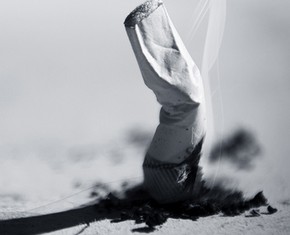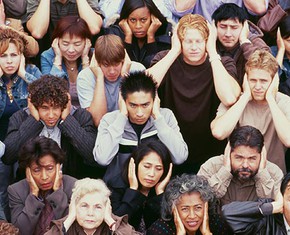The views expressed in our content reflect individual perspectives and do not represent the authoritative views of the Baha'i Faith.
How, in this age of aggressive and even vicious criticism of others, can we ever possibly begin to generate harmony and unity?
We could start, the Baha’i teachings say, by refusing to mention the faults, sins and failings of other people:
Breathe not the sins of others so long as thou art thyself a sinner. Shouldst thou transgress this command, accursed wouldst thou be, and to this I bear witness. – Baha’u’llah, The Hidden Words of Baha’u’llah, p. 10.
Just imagine what a world without fault-finding and backbiting might look like. All of the hurt that comes from being disrespected, gossiped about or put down would gradually fade away. If we looked at the good qualities of each person rather than the bad qualities, our outlook on life would immeasurably improve. Cynicism, criticism and censure could even become socially unacceptable. Those who insulted, reviled or attacked others would no longer be exalted, praised or elevated to positions of leadership.
You can start that process today by refusing, from this minute forward, to speak ill of anyone. You’ll be amazed, when you stop finding faults in other people, how your own outlook will improve.
One of the wisest people I ever met was an Inuit native named Art Jess. Art didn’t talk much—I can remember riding along in his truck as he drove for 400 miles, and not hearing him speak more than ten words during the entire trip. As a consequence of his avoidance of idle speech, you knew every word he spoke was important. Once, when Art and I were talking—or, more likely, I was talking and he was patiently listening—I thoughtlessly criticized one of the negative character traits of a person we both knew. Art considered what I had said for a minute, and his reply stunned me. He said “Oh, yeah—I have that problem, too. I’m working on it, though.”
His seemingly simple reply taught me so much. I was just a teenager at the time, but I learned that Art always took the side of the oppressed, the downtrodden, the insulted and the ones who struggled. I also learned, from that one comment he made, that my criticism of another person only revealed my own faults—my lack of understanding, my impatience and my deep need for more spiritual development.
After all, every one of us is imperfect. We all have faults. We all have feelings, too, and those feelings are easily hurt. The hurt feelings that come from negative, insulting or backbiting comments persist for a very long time in our hearts and souls—and they often result in simmering rage, which produces retribution and revenge, which just continues the vicious cycle. That’s why the old saying—hurt people hurt people—rings so true.
No one on this Earth can truthfully say that they have reached a state of physical, mental or spiritual consummation or perfection. That’s the essential nature of the human reality: no matter how far we advance in any realm, we can always go farther. The Baha’i teachings say “the perfections of existence are infinite:”
If you examine the matter with care, you will see that even in their most outward sense the perfections of existence are infinite; for it is impossible to find any created thing such that nothing superior to it can be imagined. For example, one cannot find in the mineral kingdom a ruby, or in the vegetable kingdom a rose, or in the animal kingdom a nightingale, such that an even better specimen cannot be imagined.
As the grace of God is infinite, so too are the perfections of man. – Abdu’l-Baha, Some Answered Questions, newly revised edition, p. 265.
So the next time you’re tempted to criticize or condemn someone else for something they’ve said or done, try this helpful exercise: consider your own faults first. Instead of pointing out someone else’s shortcomings, look into your own heart and find one of your own:
Never become angry with one another. Let your eyes be directed toward the kingdom of truth and not toward the world of creation. Love the creatures for the sake of God and not for themselves. You will never become angry or impatient if you love them for the sake of God. Humanity is not perfect. There are imperfections in every human being, and you will always become unhappy if you look toward the people themselves. But if you look toward God, you will love them and be kind to them, for the world of God is the world of perfection and complete mercy. Therefore, do not look at the shortcomings of anybody; see with the sight of forgiveness. The imperfect eye beholds imperfections. The eye that covers faults looks toward the Creator of souls. He created them, trains and provides for them, endows them with capacity and life, sight and hearing; therefore, they are the signs of His grandeur. You must love and be kind to everybody, care for the poor, protect the weak, heal the sick, teach and educate the ignorant. – Abdu’l-Baha, The Promulgation of Universal Peace, p. 92.
It is my hope that you may consider this matter, that you may search out your own imperfections and not think of the imperfections of anybody else. Strive with all your power to be free from imperfections. Heedless souls are always seeking faults in others. What can the hypocrite know of others’ faults when he is blind to his own? … As long as a man does not find his own faults, he can never become perfect. Nothing is more fruitful for man than the knowledge of his own shortcomings. – Ibid., p. 244.
Then, if your own faults, shortcomings and imperfections aren’t sobering enough, take Baha’u’llah’s advice:
If ye become aware of a sin committed by another, conceal it, that God may conceal your own sin. – Baha’u’llah, Epistle to the Son of the Wolf, p. 55.
Blessed are the learned that pride not themselves on their attainments; and well is it with the righteous that mock not the sinful, but rather conceal their misdeeds, so that their own shortcomings may remain veiled to men’s eyes. – Baha’u’llah, Gleanings from the Writings of Baha’u’llah, p. 315.
















Comments
Sign in or create an account
Continue with Googleor